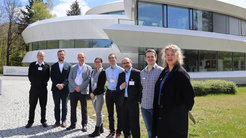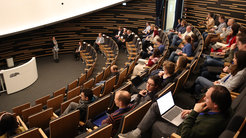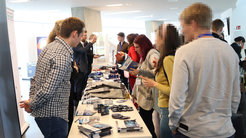From Astronomical Research to Industry
Career opportunities for astronomers in satellite communications were highlighted at an information event.
The Max Planck Institute for Astronomy (MPIA), in cooperation with the German Centre for Satellite Communications (DeSK) e.V., invited young scientists from Heidelberg’s astronomical research community to a career forum at the Haus der Astronomie. Four German companies that develop modern technologies for communication with satellites introduced themselves and offered attendees the opportunity to talk about possible career paths beyond academia.

For many astronomers, a scientific career after graduation is not an option. This is all the more reason for them to gain insights into exciting alternative career paths to which they can contribute their expertise. On the other hand, the high-tech industry is constantly on the lookout for young talents and specialists. To bring these two groups together, the Max Planck Institute for Astronomy (MPIA) and the German Centre for Satellite Communication (DeSK) e.V. held a half-day symposium in the House of Astronomy.
Four German companies involved in communication technology and satellite communication applications presented themselves. With keynote speeches and information displays, the representatives of these institutions reported on their range of activities and possible links to astrophysical research.
The following companies were represented:

- ND SatCom GmbH, Immenstaad
- Rohde & Schwarz GmbH & Co. KG, Munich
- telent GmbH, Backnang
- TESAT Spacecom GmbH & Co. KG, Backnang

A lively exchange of detailed questions and answers developed between the 30 interested participants from the field of astronomical research and the speakers. The discussion then continued in numerous personal conversations, which enabled a more concrete comparison between the researchers’ skills and the technology companies’ requirements.
“The collaboration with DeSK is terrific. Many physics students are already acquiring skills with us that are also interesting to the high-tech industry. This is because astrophysical research at MPIA has direct links to the development and construction of complex measuring instruments installed on the largest telescopes on Earth or in space,” says Klaus Jäger, Scientific Coordinator of the MPIA. “Talents for project management, scientific thinking or IT are also in high demand outside of basic research.”
Dilara Betz, Managing Director of DeSK e. V., and Klaus Jäger agree that this should be the start of further similar events.
MN














